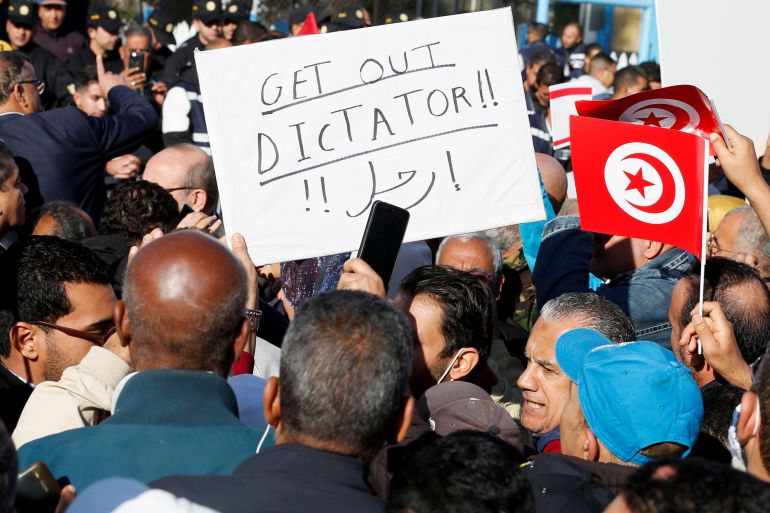Tunisians protest against President Saied’s power grab
Thousands of people gather near Tunisia’s suspended parliament to protest against President Saied’s power grab.

Tunisian police have clashed with protesters near the chamber of the suspended parliament as demonstrators marched against President Kais Saied’s seizure of political power four months ago.
Hundreds of police had blocked off the area where thousands of protesters were gathering on Sunday to demand that Saied restore the parliament and normal democratic rule.
Keep reading
list of 3 itemsTunisia’s #MeToo: Landmark sexual harassment case kicks off
How Tunisia reached financial meltdown
Increasingly vocal opposition, along with a looming crisis in public finances, may pose a new test of how Saied and the new government he has appointed will tackle threats to their authority.
“Shut down Kais Saied” and “Freedom! Freedom! End the police state!” protesters chanted as they pulled down barriers obstructing the roads leading to the parliament building at the capital’s Bardo palace, leading to clashes.
“We are under one-man rule since July 25 … we will stay here until they open the roads and end the siege,” Jawher Ben Mbarek, a protest leader, told Reuters news agency.

Saied seized nearly all powers in July, suspending the parliament and dismissing the government in a move his critics called a coup, before installing a new prime minister and announcing he could rule by decree.
The president said his actions were needed to end governmental paralysis after years of political squabbling and economic stagnation, and has promised to uphold rights and freedoms won in the 2011 revolution that brought democracy.
His moves appeared to have widespread popularity and thousands of his supporters gathered for a rally to back him last month.
However, several prominent politicians have been arrested and hundreds have faced travel bans, while a former president living outside Tunisia, Moncef Marzouki, faces prosecution for his verbal attacks on Saied.
Journalist Elizia Volkmann, reporting from the protests near parliament, said the police have “completely blocked” the area around the building and have established checkpoints but that there is still a “slow and steady stream” of people seeking to join the demonstrations.
“A lot of protesters have large printed placards or pictures of journalists and members of parliament, lawyers, who have been arrested or imprisoned since July 25,” Volkmann said.
“They want to return to normal functioning of parliament,” she added. “They want to return to the 2014 constitution, they want Kais Saied to step down and they would like to see new … [presidential and legislative] elections held.”
While demonstrators who attend anti-government protests are usually identified as supporters of the Ennahdha party, which was the biggest party in the now-suspended parliament, Volkmann said the crowd in Sunday’s rally was “very diverse”.
Ben Mbarek, a member of an initiative called Citizens against the Coup, which called for the protests on Sunday, said at a news conference that Tunisian authorities are “restricting travel” and limiting “modes of transport” in Tunis in a bid to prevent people from attending the rally – a move he said violated freedom of expression.
Sunday’s protest followed clashes last week between police and protesters in the southern town of Agareb in which one person was killed.
“Tunisia is isolated internationally now with the closing of parliament and the coup … we want to restore democracy,” Abderrouf Betbaib, a former Saied adviser who was at the front of the protest, told Reuters.